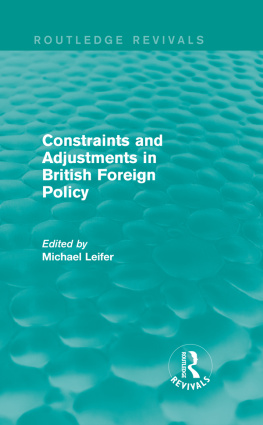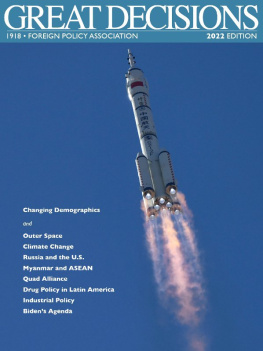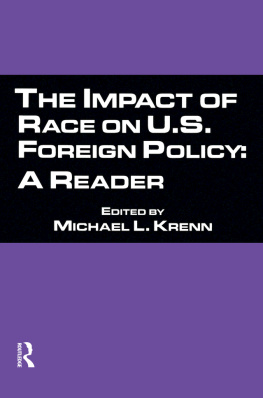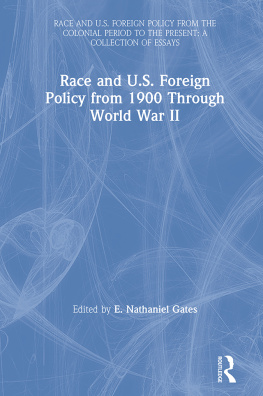Singapores Foreign Policy
This book assesses the profound influence on Singapores foreign policy of its governments perception of the island-states innate vulnerability.
In the years following its traumatic separation from Malaysia, Singapore has established itself as the leading economy in South-East Asia. Its economic strength has carried it through the East Asian economic crisis at the end of the 1990s, as well as providing the resources for a modern defence capability. Singapores economic and military strength and its bilateral and multilateral diplomatic achievements have ensured its international status. Yet, despite an assured place within the international community, Singapores foreign policy has continued to be influenced by a deep-seated sense of vulnerability. That vulnerability arises from a limited physical scale, a confined geopolitical location and a prevailing ethnic-Chinese identity, which troubles close neighbours. Singapores political leaders, from the first Prime Minister, Lee Kuan Yew, onwards have never allowed themselves to take the sovereign status or the political future of the island-state for granted. That abiding concern underlies its conduct of foreign policy.
Michael Leifer is Director of the Asia Research Centre at the London School of Economics and Political Science. His previous publications include ASEAN and the Security of South-East Asia and Dictionary of the Modern Politics of South-East Asia.
Politics in Asia series
Edited by Michael Leifer
London School of Economics and Political Science
ASEAN and the Security of South-East Asia
Michael Leifer
Chinas Policy towards Territorial Disputes
The Case of the South China Sea Islands
Chi-kin Lo
India and Southeast Asia
Indian Perceptions and Policies
Mohammed Ayoob
Gorbachev and Southeast Asia
Leszek Buszynski
Indonesian Politics under Suharto
Order, Development and Pressure for Change
Michael R.J. Vatikiotis
The State and Ethnic Politics in Southeast Asia
David Brown
The Politics of Nation Building and Citizenship in Singapore
Michael Hill and Lian Kwen Fee
Politics in Indonesia
Democracy, Islam and the Ideology of Tolerance
Douglas E. Ramage
Communitarian Ideology and Democracy in Singapore
Beng-Huat Chua
The Challenge of Democracy in Nepal
Louise Brown
Japans Asia Policy
Wolf Mendl
The International Politics of the Asia-Pacific, 19451995
Michael Yahuda
Political Change in Southeast Asia
Trimming the Banyan Tree
Michael R.J. Vatikiotis
Hong Kong
Chinas Challenge
Michael Yahuda
Korea versus Korea
A Case of Contested Legitimacy
B.K. Gills
Taiwan and Chinese Nationalism
National Identity and Status in International Society
Christopher Hughes
Managing Political Change in Singapore
The Elected Presidency
Kevin Y.L. Tan and Lam Peng Er
Islam in Malaysian Foreign Policy
Shanti Nair
Political Change in Thailand
Democracy and Participation
Kevin Hewison
The Politics of NGOs in South-East Asia
Participation and Protest in the Philippines
Gerard Clarke
Malaysian Politics under Mahathir
R.S. Milne and Diane K. Mauzy
Indonesia and China
The Politics of a Troubled Relationship
Rizal Sukma
Arming the Two Koreas
State, Capital and Military Power
Taik-young Hamm
Engaging China
The Management of an Emerging Power
Edited by Alastair Iain Johnston and Robert S. Ross
Philippine Politics and Society in the Twentieth Century
Colonial Legacies, Post-Colonial Trajectories
Eva-Lotta E. Hedman and John T. Sidel
Constructing a Security Community in Southeast Asia
ASEAN and the Problem of Regional Order
Amitav Acharya
First published 2000
by Routledge
11 New Fetter Lane, London EC4P 4EE
Simultaneously published in the USA and Canada
by Routledge
29 West 35th Street, New York, NY 10001
Routledge is an imprint of the Taylor & Francis Group
This edition published in the Taylor & Francis e-Library, 2001.
2000 Michael Leifer
All rights reserved. No part of this book may be reprinted or reproduced or utilised in any form or by any electronic, mechanical, or other means, now known or hereafter invented, including photocopying and recording, or in any information storage or retrieval system, without permission in writing from the publishers.
British Library Cataloguing in Publication Data
A catalogue record for this book is available from the British Library
Library of Congress Cataloging in Publication Data
Leifer, Michael.
Singapores foreign policy: coping with vulnerability / Michael Leifer.
p. cm. (Politics in Asia)
Includes bibliographical references and index.
1. SingaporeForeign relations.
I. Title. II. Politics in Asia series.
DS610.7 .L44 2000
327.5957dc21 99-088864
ISBN 0-415-23352-6 (hbk)
ISBN 0-415-23353-4 (pbk)
ISBN 0-203-12951-2 Master e-book ISBN
ISBN 0-203-17687-1 (Glassbook Format)
As a young academic, who developed a professional interest in South-East Asia while teaching at the University of Adelaide, Singapore was my first port of call in that region. At the time, the island enjoyed only self-governing status with foreign affairs and defence the responsibility of the British colonial power. Singapores entry into the Federation of Malaysia followed soon after my first visit and then, within less than two years, an unanticipated independence was acquired. The Singapore story has been told in many forms, including the autobiographical version of the road to independence in August 1965 by Lee Kuan Yew, the island-states first Prime Minister. This volume takes up the foreign policy dimension of the Singapore story from that historic juncture.
Singapore inspires admiration and respect primarily because of its economic and social accomplishments but its diplomatic role has not been the subject of the same attention. This volume is not intended as a tribute to Singapore, although it may appear to read as such. It represents an attempt to explore and explain Singapores conduct of foreign policy with reference to the same realist outlook that has characterised the approach to economic development and urban planning. The term vulnerability in the title has been chosen because it expresses a condition experienced in Singapore on the morrow of a traumatic separation from Malaysia and a move to international status that has remained an abiding factor in the minds of those responsible for foreign policy. That factor has persisted as an underlying premise despite the remarkable changes in Singapores material condition and defence capability that have taken place since independence. Because Singapores circumstances are unique, it does not necessarily follow that there are clear lessons to be learned by other states from its conduct of foreign relations. Nonetheless, that conduct is of sufficient intrinsic interest to be worth recounting for its own sake.






